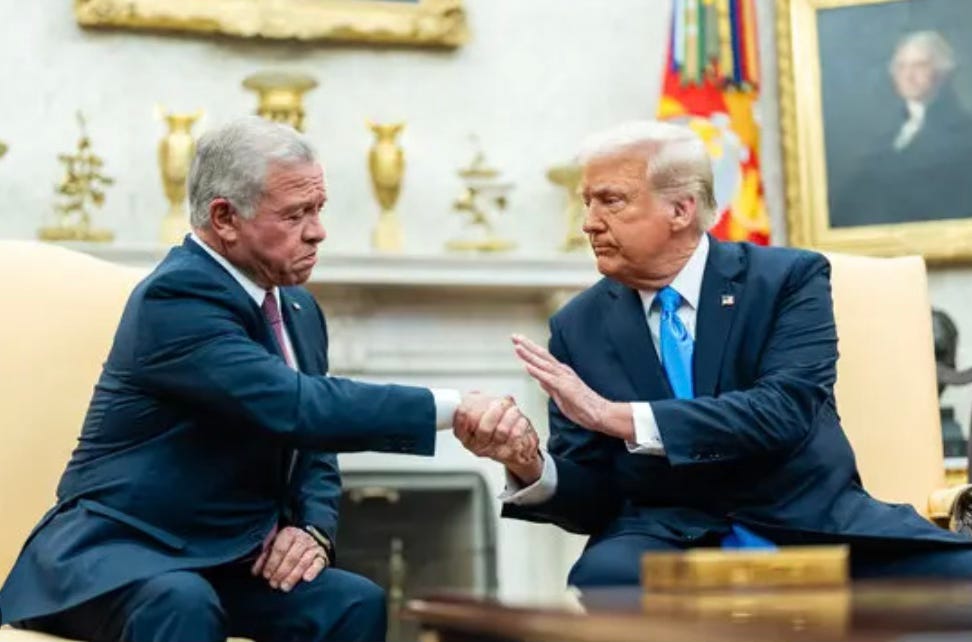Arabs speak through boycotts against Israel and the West
Some question Arab unity against Israel and lack of mass pro-Palestine demonstrations. But the Arabs are here- boycotting like no other.
Since Israel’s "self-defense" turned into a full-scale genocide in Gaza after October 7, protests erupted across the world. But something stood out—no tidal wave of millions flooding the streets, especially in Arab and Muslim countries. The absence puzzled many in the West. In London, at more than one gathering—including those filled with policymakers—I kept hearing the same remark: Western youth seem to care more about Palestine than their Arab neighbors do. A shallow take, laced with Orientalist undertones.
The reason protests in the Middle East haven’t erupted on a massive scale is simple: authoritarian leaders don’t allow them. They crack down on any gathering that reaches a critical size, regardless of whether the cause aligns with their own interests. Why? Because they fear what social movement theorists call a scale shift—the moment when a protest mutates, grows, and becomes system-challenging. And after the Arab Uprisings, that fear is heightened.
The concept of authoritarian resilience is overrated, and these regimes know it. The downfall of a Middle Eastern autocrat may very well begin with a sentence like this in a newspaper: What started as protests against the genocide in Gaza quickly turned into demands for his resignation… These leaders know their grip is tenuous, their people suffocated—by repression, by economic despair—and that at some point, something will tip. The problem is, no one, not even the most organized opposition, knows exactly when.
But one thing, we know - pro-Palestinian activism has long served as an entry point into broader opposition against authoritarianism. (As I noted in this earlier post, Sisi has been particularly on edge these days since the fall of Assad.)
At first, Sisi allowed Egyptians to express their outrage against Israel’s assault, albeit under strict conditions. Protests were sanctioned but only in designated areas, far from places with revolutionary memory. Not in Maidan Tahrir. Because maidans remember. But Egyptians, unsurprisingly, broke the script. They moved from the state-approved zones to Tahrir Square, and they were met with brute force. Therefore, dissent had to find another channel. And it did.
Egyptians turned to an old yet potent weapon—boycott. They began systematically avoiding Western brands, hitting them where it hurts: their bottom line. McDonald’s, Starbucks, and other corporate giants reported steep financial losses. Western-branded restaurants in Cairo sat empty, while even locally owned businesses serving "Western-style" food felt compelled to perform solidarity—hanging Palestinian flags and covering their storefronts in pro-Gaza slogans. In one revealing case, a Starbucks kiosk in Nadi al-Ahly, Zamalek, stripped its branding, even removing the iconic logo from its paper cups. It didn’t work. The people of Cairo knew better.
Prof Neil Ketchley of Oxford, who has been researching the criminalization of the BDS movement in the U.S. and UK, recently presented a small part of his broader project that looked at Egypt’s boycott movement. Working alongside his PhD student, Amytess Girgis, and his colleague at the American University in Cairo, Sean Lee, Ketchley examined the mechanics and implications of this economic resistance.
They found that Google Trends data showed a surge in Arabic searches for muqāta'a (boycott) following Israel’s Gaza offensive, mirroring the movement’s widespread traction. The boycott had grown so significant that even pro-regime figures in Egypt began advising consumers to "support local businesses"—some of which, ironically, were foreign franchises themselves. Meanwhile, domestic alternatives to boycotted products saw their sales skyrocket.
Activists also embraced digital tools to sustain momentum. The Qadiyatī ("My Cause") app, developed in Egypt and launched in late October 2023, became a hub for boycott coordination. With over a million downloads and country-specific versions, it allows users to scan barcodes, check company affiliations, and suggest new boycott targets. The boycott’s staying power underscores what many fail to grasp: this is not passive resistance. It is a form of collective action as deliberate and disruptive as street mobilization.
Ketchley et al. argue that dismissing these economic boycotts underestimates the depth of political contention in the region. While Arab autocrats crush protests, boycotts provide a rare avenue for dissent—one that cannot be policed as easily. The movement also challenges the lazy narrative that Arabs are indifferent to Palestine.

Beyond the Middle East, the boycott movement has stirred unease in the West. The U.S. and Europe have ramped up efforts to criminalize BDS, despite legal pushback. And here lies the irony: as boycotts become increasingly difficult in Western democracies, they have become the most viable form of resistance in the Arab world. Economic activism, once dismissed in mainstream political analysis, may shape both regional and global discourse on Palestine. Especially after Trump framed a crime against humanity—ethnic cleansing and mass displacement—as an "out-of-the-box" managerial solution for Gaza.
Also: If you are interested in the politics of contention and Egypt, I highly recommend reading Neil’s book, Egypt in a Time of Revolution.
The blueprint of Trump’s plan for Gaza is detailed

Now we know where Donald Trump’s "beautiful real estate plan" for Gaza—the one that would turn it into the "Riviera of the Middle East"—actually came from. The grand idea wasn’t conjured up in a late-night brainstorming session at Mar-a-Lago. It originated with an Israeli-American economist, Joseph Perlzman of Washington University, who put it together in a 49-page document. First, he approached the Biden team, who weren’t interested. Then, the plan landed in Trump’s orbit, where it was met with open arms. The core idea? Gaza’s entire population must be removed so that a Build-Operate-Transfer (BOT) model can be implemented. A gleaming coastal paradise, minus the people who have lived there for generations.
Even as I write this, I feel a mix of rage and something else—something beyond words. But we have to press on. We need to know exactly what we are up against in this moment, at this juncture in history. The Times uncovered Perlzman’s blueprint through a podcast appearance he made, arguing—correctly—that this isn’t just Trump riffing off the top of his head. The plan to turn Gaza into a real estate project, with complete disregard for the people who belong to it, is detailed and calculated. Its title: An Economic Plan for Rebuilding Gaza: A BOT (Build-Operate-Transfer) Approach.
Egypt plays a crucial role in this so-called plan. "The place must be completely emptied out. I mean, literally emptied out, dug up from scratch." Perlzman recommends leveling all 365 square kilometers of Gaza, then carving out three four-kilometer-wide buffer zones between Gaza, Israel, and Egypt—akin to the demilitarized zone between North and South Korea. His next stroke of genius? The U.S. should "lean on Egypt" to accept displaced Palestinians because, as he puts it, "Egypt is a bankrupt state" and deeply indebted to Washington.
Sisi, unsurprisingly, dismissed Trump’s Gaza "Riviera" fantasy as yet another attempt to dissolve the Palestinian issue while offloading the burden onto Cairo. He made his position clear: Sinai would not be used to absorb Gaza’s crisis. But there are two key points at play. First, you would have to be extraordinarily naive to not see this plan for what it was—and Sisi is anything but. This is not about development; it is about erasure. Second, it would be a security threat. Any integration of Gaza with Sinai would drag Egypt deeper into instability, especially with Hamas, which Cairo views as an extension of the Muslim Brotherhood and a serious threat. The last thing Sisi wants is an enraged Hamas presence near his already volatile Sinai.
Yet, as the "out-of-the-box thinker" professor who devised this vision without considering the people it would uproot pointed out, Egypt is vulnerable. And Sisi knows it. Egypt is hooked on U.S. military aid, and Trump has never been shy about using that as leverage. Push too hard, and Washington could turn off the tap. Sisi has spent years cultivating his image as the White House’s indispensable strongman—a firewall against jihadism, a reliable partner against Iran, a safe pair of hands. He isn’t about to throw that away. So, while Egypt rejects the plan outright, it won’t escalate the confrontation.
Findings and fragments
**Hamas has announced that it will not release the next group of Israeli hostages this weekend as scheduled, citing what it claims are Israeli violations of the ceasefire—a move that threatens to unravel the already fragile truce, now in its third week.
Meanwhile, Donald Trump escalated tensions by warning that “hell is going to break out” if Hamas does not release all Israeli hostages by Saturday.
Here is a brief history of ceasefire talks between Israel and Hamas since 2008 written by Zachary Foster.
Israel and Hamas signed at least six ceasefire agreements in 2008, 2012, 2014, 2019 and 2021. Each case followed a similar trajectory. Hamas, by and large, observed the agreement. Israel, by and large, did not. Eventually, Israeli violence elicited Hamas rocket attacks, which elicited an Israeli campaign of aggression in Gaza, which resulted in another ceasefire, and then the pattern repeated itself.
**Tom Stevenson’s Illusions of Containment in the 6 February London Review of Books is a sharp, unsentimental dissection of Hamas and its entrenchment in Gaza. He closes with an unflinching conclusion: Israel’s violence won’t eliminate Hamas as Netanyahu claims—it will only deepen its ranks with a new generation of recruits. More radical, more violent.
Hamas has been weakened (it is currently unable to prevent the looting of aid trucks in Gaza), but it has not been destroyed. Mohammed Sinwar has replaced his brother as de facto leader in Gaza. Hamas is still part of Gazan society. Its administrative system is battered, but it has survived. On 14 January, Blinken said that, according to US assessments, ‘Hamas has recruited almost as many new militants as it has lost.’ The movement was born of the occupation, but the genocidal attack on Gaza exceeds the cruelty of its forming conditions. Hamas has transformed many times in the past, and it will do so again. The torture camps, the recorded rape of Palestinian detainees, the lines of stripped, blindfolded men, kneeling in the dirt among the rubble of what was once their homes: what will come from this? Israel may end up wishing for the return of the version of Hamas it once cursed.
**Syria’s new president, Ahmed al-Sharaa, sat down with The Rest Is Politics, one of Britain’s most popular political podcasts, hosted by Rory Stewart (former Conservative minister) and Alastair Campbell (Tony Blair’s former spin doctor). The appearance alone is news. His rhetoric is precise, tailored for Western ears—smooth, deliberate, and increasingly polished with each press encounter. Here it is.


